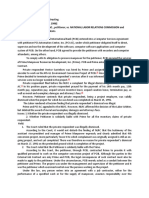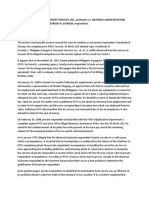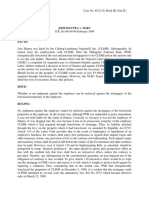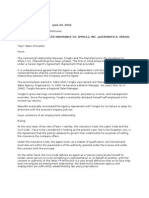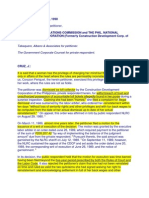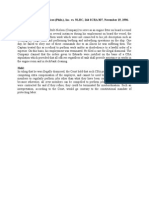Norma Mabeza Vs NLRC
Norma Mabeza Vs NLRC
Uploaded by
Xheyla MariCopyright:
Available Formats
Norma Mabeza Vs NLRC
Norma Mabeza Vs NLRC
Uploaded by
Xheyla MariOriginal Description:
Original Title
Copyright
Available Formats
Share this document
Did you find this document useful?
Is this content inappropriate?
Copyright:
Available Formats
Norma Mabeza Vs NLRC
Norma Mabeza Vs NLRC
Uploaded by
Xheyla MariCopyright:
Available Formats
Norma Mabeza vs NLRC April 18, 1997 Labor Standards Wages Facilities vs Supplements Mabeza was an employee hired
ed by Hotel Supreme in Baguio City. In 1991, an inspection was made by the DOLE at Hotel Supremeand the DOLE inspectors discovered several violations by the hotel management. Immediately, the owner of the hotel, Peter Ng,directed his employees to execute an affidavit which would purport that they have no complaints whatsoever against Hotel Supreme. But Mabeza refused to certify said affidavit with the fiscals office so this led to her dismissal. She sued Peter Ng and one of hercomplaints against him is underpayment because her wage was less than the minimum wage. Peter Ng argued that the reason forsuch low payment was because she was being given free lodging, water, electricity and water consumption by the hotel. ISSUE: Whether or not such amenities provided by the hotel be considered as facilities which are deductible from Mabezas wage. HELD: No. There are requisites before such can be done and they are:1. Proof must be shown that such facilities are customarily furnished by the trade.2. The provision of deductible facilities must be voluntarily accepted in writing by the employee.3. Facilities must be charged at fair and reasonable value.None of these were complied with in the case at bar. More significantly, the food and lodging, or the electricity and water consumedby Mabeza were not facilities but supplements. A benefit or privilege granted to an employee for the convenience of the employer isnot a facility. The criterion in making a distinction between the two not so much lies in the kind (food, lodging) but the purpose.Considering, therefore, that hotel workers are required to work different shifts and are expected to be available at various odd hours,their ready availability is a necessary matter in the operations of a small hotel, such as Hotel Supreme.
BATAAN SHIPYARD vs. NLRC (1988)FACTS: The National Federation of Labor Unions (NAFLU)is a labor organization in petitioner Bataan Shipyard& Engineering Co., Inc. The Company has thousandemployees in its payroll and more than a hundred of them belong to the said labor organization. Sometime before 1984, the Company filed withthe NLRC an application for the retrenchment of 285 of its employees on the ground that the firm hadbeen incurring heavy losses. In the meantime, someemployees who had been on sick leave earlier wereconsidered retrenched. All of those so retrenchedhappen to be officers and members of the NAFLU. Issue: Whether the Company is guilty of discriminatory acts in the selection of employees to be retrenched Held: YES. The retrenchment undertaken by the Company is valid.However, the manner in which this is exercised should notbe tainted with abuse of discretion. Labor is a person'smeans of livelihood. He cannot be deprived of his labor orwork without due process of law. The retrenchment of employees who belong to a particular union, with nosatisfactory justification why said employees were singledout, constitutes ULP.In this case, the Company had indeed been discriminatoryin selecting the employees who were to be retrenched. Allof the retrenched employees are officers and members of the NAFLU. It leads Us to conclude that the firm had beendiscriminating against membership in the NAFLU, an actwhich amounts to interference in the employees' exerciseof their right of self-organization. This interference isconsidered an act of ULP MADRIGAL & CO. vs. HON. ZAMORA (1987)FACTS: In December 1973, respondent Madrigal CentralOffice Employees Union sought for the renewal of itsCBA with the petitioner company. It proposed a wageincrease of P200.00 a month, an allowance of P100.00 a month, and other economic benefits. By an alleged resolution of its stockholders, thepetitioner reduced its capital stock from 765,000shares to 267,366 shares. Petitioner alleged thatbecause of the desire of the stockholders to phaseout the operations of the Madrigal & Co. due to lackof business incentives and prospect, it had to reduceits capital stock and effected a retrenchment policy(downsizing) of its employees and operations Petitioner applied for clearance to terminate theservices of a number of employees pursuant to itsretrenchment program. Respondent union filed acomplaint of illegal lockout against the petitioner. Respondent Union filed a complaint for ULP.
Issue: Whether the mass-lay off of petitioner due toalleged income loss constitutes ULP Held: YES. Petition Denied The petitioners capital reduction efforts, to camouflagethe fact that it has been making profits, and to justify the mass lay-off of its employees, especially union members,were an ULP which can neither be countenanced norcondoned.Petitioner, confronted with the demand of the union forwage increases, decided to evade its responsibility towardsthe employees by a devised capital reduction. While thereduction in capital stock created a need for retrenchment,it was just a mask for the purge of union members, who,by then, had agitated for wage increases. In the face of the petitioner company's piling profits, the unionists hadthe right to demand for such salary adjustments.Retrenchment can only be availed of if the company islosing or meeting financial reverses in its operation. Thusthe mass lay-off or dismissal of the employees under theguise of retrenchment policy is a lame excuse and averitable smoke-screen of its scheme to bust the Unionand thus unduly disturb the employment tenure of theemployees concerned, which act is certainly an ULP COMPLEX ELECTRONICS UNION. vs. NLRC (1999)FACTS: Complex Electronics Corporation was asubcontractor of electronic products. Its customerswere foreign-based companies with different productlines. One of its customers is the Lite-On PhilippinesElectronics Co. Complex received a message from Lite-OnPhilippines requiring it to lower its price by 10%.Complex informed Lite-On that such request was notfeasible as they were already incurring losses at thepresent prices of their products. Complex informed theemployees that it was left with no alternative but toclose down the operations of the Lite-On Line. Thecompany promised that it would follow the law bygiving 1 month notice and retrenchment pay. Sometime later, the machinery, equipment andmaterials being used for production at Complex werepulled-out from the company premises and transferredto the premises of Ionics Circuit, Inc. in Laguna. Thefollowing day, Complex totally closed its operation. The Complex Employees Union filed a complaintfor ULP, illegal closure/illegal lockout and moneyclaims. It claims that business has not ceased atComplex but was merely transferred to I onics, arunaway shop, which is an act constituting ULP. Toprove that Ionics was just a runaway shop, petitionerasserts that Complex owns the majority of the sharescomprising the increased capital stock of Ionics. TheUnion alleged that the reason for the closure of theestablishment was due to the union activities of theemployees. Issue: Whether Complex Electronics Corp. committed ULP HELD: NO Resorting to a runaway shop is ULP. A runaway shop isdefined as an industrial plant moved by its owners fromone location to another to escape union labor regulationsor state laws, but the term is also used to describe a plantremoved to a new location in order to discriminate against employees at the old plant because of their unionactivities. It is one wherein the employer moves itsbusiness to another location or it temporarily closes itsbusiness for anti-union purposes.In this case, Ionics was not set up for the purpose of transferring the business of Complex. At the time thelabor dispute arose, Ionics was already existing as anindependent company. It cannot, therefore, be said thatthe temporary closure in Complex and its subsequenttransfer of business to Ionics was for anti-unionpurposes.We, likewise, disagree with the Union that there was inthis case an illegal lockout/illegal dismissal. Lockout isthe temporary refusal of employer to furnish work as aresult of an industrial or labor dispute. It may bemanifested by the employer's act of excluding employeeswho are union members.
PHILCOM EMPLOYEES UNION VS. PHILIPPINE GLOBAL COMMUNICATIONS Promulgated: and PHILCOM CORPORATION , G.R. No. 144315 July 17, 2006 FACTS: 1. Upon the expiration of the Collective Bargaining Agreement (CBA)between Philcom Employees Union (PEU or union, for brevity) and PhilippineGlobal Communications, Inc. (Philcom, Inc.), the parties started negotiationsfor the renewal of their CBA. 2. At a conciliation conference held at the NCMB-NCR office, the partiesagreed to consolidate the two (2) Notices of Strike filed by the union and tomaintain the status quo during the pendency of the proceedings. 3. While the union and the company officers and representatives weremeeting, the remaining union officers and members staged a strike at thecompany premises, barricading the entrances and egresses thereof andsetting up a stationary picket at the main entrance of the building. 4.
The company immediately filed a petition for the Secretary of Laborand Employment to assume jurisdiction over the labor dispute in accordancewith Article 263(g) of the Labor Code. 5. Acting Labor Secretary Cresenciano B. Trajano issued an Orderassuming jurisdiction over the dispute, enjoining any strike or lockout,whether threatened or actual, directing the parties to cease and desist fromcommitting any act that may exacerbate the situation, directing the strikingworkers to return to work within twenty-four (24) hours from receipt of theSecretarys Order and for management to resume normal operations, as wellas accept the workers back under the same terms and conditions prior to thestrike.
6. The union filed a Motion for Reconsideration assailing, among others,the authority of then Acting Secretary Trajano to assume jurisdiction over thelabor dispute. 7. The company, on the other hand, raised in its position paper the soleissue of the illegality of the strike staged by the union. 8. On the premise that Labor Secretary cannot rule on the issue of thestrike since there was no petition to declare the same illegal. 9. Neither do these complaints amount to gross violations which, thus,may be treated as unfair labor practices outside of the coverage of Article261. 10. The Union failed to convincingly show that there is flagrant and/ormalicious refusal by the Company to comply with the economic provisionsstipulated in the CBA. 11. With respect to the charges of contractualization and economicinducement, this Office is convinced that the acts of said company qualify as avalid exercise of management prerogative. 12. The act of the Company in contracting out work or certain servicesbeing performed by Union members should not be seen as an unfair laborpractice act per se. 13. There remains the issue on bargaining deadlock. The Company hasdenied the existence of any impasse in its CBA negotiations with the Unionand instead maintains that it has been negotiating with the latter in good faithuntil the strike was initiated. 14. As pointed out by the Union, there are already thirty-seven (37) itemsagreed upon by the parties during the CBA negotiations even before thesewere suspended. 15. We now come to the question of whether or not the strike staged bythe Union on November 17, 1997 is illegal. The Company claims it is, havingbeen held on grounds which are non-strikeable, during the pendency of preventive mediation proceedings in the NCMB, after this Office has assumed jurisdiction over the dispute, and with the strikers committing prohibited andillegal acts. The Company further prays for the termination of some 20 Unionofficers who were positively identified to have initiated the alleged illegalstrike. The Union, on the other hand, refuses to submit this issue forresolution. 16. Considering the precipitous nature of the sanctions sought by theCompany, i.e., declaration of illegality of the strike and the correspondingtermination of the errant Union officers, this Office deems it wise to defer thesummary resolution of the same until both parties have been afforded dueprocess. The non-compliance of the strikers with the return-to-work orders,while it may warrant dismissal, is not by itself conclusive to hold the strikersliable. Moreover, the Unions position on the alleged commission of illegalacts by the strikers during the strike is still to be heard. Only after a full-blown hearing may the respective liabilities of Union officers and members bedetermined. The case of Telefunken Semiconductors Employees Union-FFW v.Secretary of Labor and Employment and Temic Telefunken Micro-Electronics(Phils.), Inc. (G.R. No. 122743 and 127215, December 12, 1997) is instructiveon this point: 17. Pending resolution of the issues of illegal strike and bargainingdeadlock which are yet to be heard, all the striking workers are directed toreturn to work within twenty-four (24) hours from receipt of this Order andPhilcom and/or Philcom Corporation are hereby directed to unconditionallyaccept back to work all striking Union officers and members under the sameterms and conditions prior to the strike. The parties are directed to cease anddesist from committing any acts that may aggravate the situation. 18. Atty. Lita V. Aglibut, Officer-In-Charge of the Legal Service, thisDepartment is hereby designated as the Hearing Officer to hear and receiveevidence on all matters and issues arising from the present labor dispute and,thereafter, to submit a report/recommendation within twenty (20) days fromthe termination of the proceedings. 19. The parties are further directed to file their respective position paperswith Atty. Lita V. Aglibut within ten (10) days from receipt of this Order. 20. Philcom Corporation (Philcom) filed a motion for reconsideration. 21. Philcom also filed a Motion to Certify Labor Dispute to the NationalLabor Relations Commission for Compulsory Arbitration. 22.
For its part, Philcom Employees Union (PEU) filed a Motion for PartialReconsideration. PEU asked the Secretary to partially reconsider the Orderinsofar as it dismissed the unfair labor practices charges against Philcom andincluded the illegal strike issue in the labor dispute. 23. The Secretary denied both motions for reconsideration of Philcom andPEU in its assailed Order of 27 November 1998. 24. PEU filed with this Court a petition for certiorari and prohibition underRule 65 of the Rules of Court assailing the Secretarys Orders. This Courtreferred the case to the Court of Appeals. 25. The Court of Appeals DENIED the petition.Hence, this petition. ISSUE: The Honorable Court of Appeals has decided a question of substance in a way not inaccord with law and jurisprudence when it affirmed the order/resolution of theSecretary of Labor dismissing the Unions charges of unfair labor practices.
RULING: The petition must fail.PEU also claims that Philcom has committed several unfair labor practices. PEUasserts that there are factual and evidentiary bases for the charge of unfair labor practicesagainst Philcom.On unfair labor practices of employers, Article 248 of the Labor Code provides: Unfair labor practices of employers. It shall be unlawful for anemployer to commit any of the following unfair labor practice:(a) To interfere with, restrain or coerce employees in the exercise of their right to self-organization;(b) To require as a condition of employment that a person or anemployee shall not join a labor organization or shall withdraw from one towhich he belongs;(c) To contract out services or functions being performed by unionmembers when such will interfere with, restrain or coerce employees in theexercise of their rights to selforganization;(d) To initiate, dominate, assist or otherwise interfere with theformation or administration of any labor organization, including the giving of financial or other support to it or its organizers or supporters;(e) To discriminate in regard to wages, hours of work, and other termsand conditions of employment in order to encourage or discouragemembership in any labor organization. x x x
(f) To dismiss, discharge, or otherwise prejudice or discriminate againstan employee for having given or being about to give testimony under thisCode;(g) To violate the duty to bargain collectively as prescribed by thisCode;(h) To pay negotiation or attorneys fees to the union or its officers oragents as part of the settlement of any issue in collective bargaining or anyother dispute; or(i) To violate a collective bargaining agreement.Unfair labor practice refers to acts that violate the workers right to organize. Theprohibited acts are related to the workers right to self-organization and to the observance of a CBA. Without that element, the acts, no matter how unfair, are not unfair labor practices. 9 The only exception is Article 248(f), which in any case is not one of the acts specified inPEUs charge of unfair labor practice.A review of the acts complained of as unfair labor practices of Philcom convinces usthat they do not fall under any of the prohibited acts defined and enumerated in Article 248of the Labor Code. The issues of misimplementation or non-implementation of employeebenefits, non-payment of overtime and other monetary claims, inadequate transportationallowance, water, and other facilities, are all a matter of implementation or interpretation of the economic provisions of the CBA between Philcom and PEU subject to the grievanceprocedure. TOYOTA MOTOR PHILS. CORP. WORKERS ASSOCIATION (TMPCWA),VERSUS (NLRC-2ND DIVISION) Facts:Toyota Motor Philippines Corporation Workers Association (Union) and its dismissedofficers and members seek to set aside the Decision of the Court of Appeals whichaffirmed the Decision and Resolution of the National Labor Relations Commission(NLRC), declaring illegal the strikes staged by the Union and upholding the dismissal of the 227 Union officers and members.On the other hand, in the related cases docketed as G.R. Nos. 158798-99, ToyotaMotor Philippines Corporation (Toyota) prays for the recall of the award of severancecompensation to the 227 dismissed employees, which was granted.In view of the fact that the parties are petitioner/s and respondent/s and vice-versain the four (4) interrelated cases, they will be referred to as simply the Union and Toyotahereafter.ISSUE:(1) WHETHER THE MASS ACTIONS COMMITTED BY THE UNION ONDIFFERENT OCCASIONS ARE ILLEGAL STRIKES; AND(2) WHETHER SEPARATION PAY SHOULD BE AWARDED TO THE UNIONMEMBERS WHO PARTICIPATED IN THE ILLEGAL STRIKES.HELD:We rule that the protest actions undertaken by the Union officials and memberson February 21 to 23, 2001 are not valid and proper exercises of their right to assembleand ask government for redress of their complaints, but are illegal strikes in breach of the Labor Code. The Unions position is weakened by the lack of permit from the City of Manila to hold rallies. Shrouded as demonstrations, they were in reality temporarystoppages of work perpetrated through the concerted action of the employees who
deliberately failed to report for work on the convenient excuse that they will hold a rallyat the BLR and DOLE offices in Intramuros, Manila, on February 21 to 23, 2001. Thepurported reason for these protest actions was to safeguard their rights against anyabuse which the med-arbiter may commit against their cause. However, the Union failedto advance convincing proof that the med-arbiter was biased against them. The acts of the med-arbiter in the performance of his duties are presumed regular. Sans ampleevidence to the contrary, the Union was unable to justify the February 2001 massactions. What comes to the fore is that the decision not to work for two days wasdesigned and calculated to cripple the manufacturing arm of Toyota. It becomesobvious that the real and ultimate goal of the Union is to coerce Toyota to finallyacknowledge the Union as the sole bargaining agent of the company. This is not a legaland valid exercise of the right of assembly and to demand redress of grievance.It is obvious that the February 21 to 23, 2001 concerted actions were undertakenwithout satisfying the prerequisites for a valid strike under Art. 263 of the Labor Code.The Union failed to comply with the following requirements: (1) a notice of strike filedwith the DOLE 30 days before the intended date of strike, or 15 days in case of unfair labor practice; (2) strike vote approved by a majority of the total union membership inthe bargaining unit
concerned obtained by secret ballot in a meeting called for thatpurpose; and (3) notice given to the DOLE of the results of the voting at least sevendays before the intended strike. These requirements are mandatory and the failure of aunion to comply with them renders the strike illegal. The evident intention of the law inrequiring the strike notice and the strike-vote report is to reasonably regulate the right tostrike, which is essential to the attainment of legitimate policy objectives embodied inthe law. As they failed to conform to the law, the strikes on February 21, 22, and 23,2001 were illegal.The Court declined to grant termination pay because the causes for dismissalrecognized under Art. 282 of the Labor Code were serious or grave in nature andattended by willful or wrongful intent or they reflected adversely on the moral character of the employees. We therefore find that in addition to serious misconduct, indismissals based on other grounds under Art. 282 like willful disobedience, gross andhabitual neglect of duty, fraud or willful breach of trust, and commission of a crimeagainst the employer or his family, separation pay should not be conceded to thedismissed employee. Based on existing jurisprudence, the award of separation pay tothe Union officials and members in the instant petitions cannot be sustained
You might also like
- MHR 520 Midterm Review 2022Document27 pagesMHR 520 Midterm Review 2022humaira.rahman100% (1)
- PESTEL Analysis of Sri LankaDocument15 pagesPESTEL Analysis of Sri Lankasajith_silva140887% (54)
- Set 9 Case DigestDocument14 pagesSet 9 Case DigestDK KaliNo ratings yet
- Cosco Philippines Shipping, Inc. vs. Kemper Insurance CompanyDocument15 pagesCosco Philippines Shipping, Inc. vs. Kemper Insurance CompanyJo Marie SantosNo ratings yet
- Cosco Phils Shipping V KemperDocument13 pagesCosco Phils Shipping V KemperErika Galceran FuentesNo ratings yet
- October 4 Labor Digests - Wages: Atok Big Wedge Mutual Benefit Association V Atok Big Wedge Mining Co. Inc (1955)Document8 pagesOctober 4 Labor Digests - Wages: Atok Big Wedge Mutual Benefit Association V Atok Big Wedge Mining Co. Inc (1955)Agnes GamboaNo ratings yet
- Case Law - Project EmployeeDocument4 pagesCase Law - Project EmployeeZeniNo ratings yet
- 1st Meeting DigestDocument63 pages1st Meeting DigestGenela RamirezNo ratings yet
- 101 Union of Filipro Employees Vs Vivar (Labor)Document1 page101 Union of Filipro Employees Vs Vivar (Labor)Kayelyn Lat100% (1)
- 11 Bankard Employees v. NLRCDocument2 pages11 Bankard Employees v. NLRCdus100% (1)
- 082-Pacific Mills, Inc. v. NLRC G.R. No. 88864 January 17, 1990Document2 pages082-Pacific Mills, Inc. v. NLRC G.R. No. 88864 January 17, 1990Jopan SJNo ratings yet
- Sorreda v. Cambridge - CaseDocument2 pagesSorreda v. Cambridge - CaseRobehgene Atud-JavinarNo ratings yet
- Stolt Nielsen Vs NLRCDocument3 pagesStolt Nielsen Vs NLRCWonder WomanNo ratings yet
- Prince Transport Vs Garcia Et. Al.Document3 pagesPrince Transport Vs Garcia Et. Al.Ambra Kaye AriolaNo ratings yet
- Law of The CaseDocument3 pagesLaw of The CaseHar RizNo ratings yet
- Group1 Employee Employer Relationship Case DigestsDocument20 pagesGroup1 Employee Employer Relationship Case DigestsJulio HarrisNo ratings yet
- Labor CasesDocument2 pagesLabor CasesKim Andaya-YapNo ratings yet
- Case No. 173 National Federation of Sugar Workers (NFSW) vs. OvejeraDocument40 pagesCase No. 173 National Federation of Sugar Workers (NFSW) vs. OvejeraCarlos JamesNo ratings yet
- Maranaw Hotels and Resort Corp Vs Court of AppealsDocument4 pagesMaranaw Hotels and Resort Corp Vs Court of AppealsVan GoghNo ratings yet
- 33 - Philippines Singapore Transit Vs NLRCDocument6 pages33 - Philippines Singapore Transit Vs NLRCArthur YamatNo ratings yet
- Wilgen Loon, Et. Al. vs. Power Master, Inc., Tri-C General Services and Sps. AlumisinDocument2 pagesWilgen Loon, Et. Al. vs. Power Master, Inc., Tri-C General Services and Sps. AlumisinDennis Jay Dencio Paras100% (1)
- Baguio Water District vs. TrajanoDocument5 pagesBaguio Water District vs. TrajanoArya StarkNo ratings yet
- Union of Filipro Employees VDocument10 pagesUnion of Filipro Employees Vmoron kaNo ratings yet
- Labor Cases 4 Tranche: Post Employment Case No. 15 Aurora Land Projects Corp. v. NLRCDocument1 pageLabor Cases 4 Tranche: Post Employment Case No. 15 Aurora Land Projects Corp. v. NLRCMae Clare BendoNo ratings yet
- Tunay Na Pagkakaisa NG Manggagawa Sa Asia Brewery V Asia BreweryDocument1 pageTunay Na Pagkakaisa NG Manggagawa Sa Asia Brewery V Asia BreweryPablo Jan Marc FilioNo ratings yet
- 5 PNB V Uy Teng PiaoDocument2 pages5 PNB V Uy Teng PiaoJudy Ann ShengNo ratings yet
- Ust Vs NLRC - G.R. No. 85519. February 15, 1990Document8 pagesUst Vs NLRC - G.R. No. 85519. February 15, 1990Ebbe DyNo ratings yet
- Mabuhay Shipping vs. NLRCDocument4 pagesMabuhay Shipping vs. NLRCMp CasNo ratings yet
- 23.) KiamcoDocument2 pages23.) KiamcoChelle OngNo ratings yet
- 276 G&M Phil v. BatomalaqueDocument13 pages276 G&M Phil v. Batomalaquedos2reqjNo ratings yet
- 12 (19) Diamond Farms v. Farms Agrarian Reform Beneficiaries Multi-Purpose CooperativeDocument19 pages12 (19) Diamond Farms v. Farms Agrarian Reform Beneficiaries Multi-Purpose CooperativeJoe RealNo ratings yet
- 7 Gustilo vs. Wyeth Philippines, Inc.Document14 pages7 Gustilo vs. Wyeth Philippines, Inc.joyeduardoNo ratings yet
- Digested Case Labor Law Batch 2Document38 pagesDigested Case Labor Law Batch 2Joanne BayyaNo ratings yet
- W Land Vs StarwoodDocument30 pagesW Land Vs StarwoodKar EnNo ratings yet
- Labor Law Jul Dec2016Document16 pagesLabor Law Jul Dec2016Ronald Allan MorenoNo ratings yet
- Almario v. Pal - F-Atienza (d2017)Document2 pagesAlmario v. Pal - F-Atienza (d2017)Kulit_Ako1No ratings yet
- Facto Partnership Among Them Was Created, and ThatDocument4 pagesFacto Partnership Among Them Was Created, and ThatkaiNo ratings yet
- JOSE HAUTEA V NLRCDocument2 pagesJOSE HAUTEA V NLRCMavic MoralesNo ratings yet
- Barba vs. Liceo de CagayanDocument3 pagesBarba vs. Liceo de CagayanIraNo ratings yet
- Outline PrelimDocument5 pagesOutline PrelimPaul Arman MurilloNo ratings yet
- Goya Inc VS Goya Employees UnionDocument7 pagesGoya Inc VS Goya Employees UnionChing GonzalesNo ratings yet
- PNB Vs Cruz (Macacua)Document1 pagePNB Vs Cruz (Macacua)AlviaAisaMacacuaNo ratings yet
- David Versus Macasio DigestDocument2 pagesDavid Versus Macasio DigestLuz Celine CabadingNo ratings yet
- Case Digest Updated 4th Year Batch 2011-2012Document127 pagesCase Digest Updated 4th Year Batch 2011-2012Angel Arriesgado-Ponla Yap100% (1)
- Golden Farms Inc Vs Hon. Ferrer-Calleja, BLRDocument3 pagesGolden Farms Inc Vs Hon. Ferrer-Calleja, BLRbrendamanganaanNo ratings yet
- Hacienda Fatima vs. National Federation of SugarCane GR149440Document1 pageHacienda Fatima vs. National Federation of SugarCane GR149440Monica FerilNo ratings yet
- Supreme Steel Corp. v. Nagkakaisang Manggagawa NG Supreme Independent Union (Nms-Ind-Apl)Document19 pagesSupreme Steel Corp. v. Nagkakaisang Manggagawa NG Supreme Independent Union (Nms-Ind-Apl)Chedeng KumaNo ratings yet
- Labor Cases 1-20Document369 pagesLabor Cases 1-20Gervin ArquizalNo ratings yet
- Periquet vs. NLRCDocument5 pagesPeriquet vs. NLRCJasper PelayoNo ratings yet
- Case # 101 - Baptist vs. NLRCDocument3 pagesCase # 101 - Baptist vs. NLRCgraceNo ratings yet
- Labor Standards Digests 3Document5 pagesLabor Standards Digests 3Stef MacapagalNo ratings yet
- 3rd Assignment Labor Case DigestsDocument44 pages3rd Assignment Labor Case DigestsJoven CamusNo ratings yet
- Stolt-Nielsen Marine Services (Phils.), Inc. vs. NLRC, 264 SCRA 307, November 19, 1996. FactsDocument1 pageStolt-Nielsen Marine Services (Phils.), Inc. vs. NLRC, 264 SCRA 307, November 19, 1996. FactsYori AvilaNo ratings yet
- Taxation Case DigestsDocument16 pagesTaxation Case DigestsDeb BieNo ratings yet
- Torts and Damages Case DigestsDocument3 pagesTorts and Damages Case DigestslchieSNo ratings yet
- Bombo Radyo Phils Vs DOLE SecretaryDocument3 pagesBombo Radyo Phils Vs DOLE Secretarysamantha koferNo ratings yet
- Baguio Country Club Corp. v. National Labor Relations Commission, G.R. No. L-55624, (November 19, 1982), 204 PHIL 194-203)Document4 pagesBaguio Country Club Corp. v. National Labor Relations Commission, G.R. No. L-55624, (November 19, 1982), 204 PHIL 194-203)JOseph GarciaNo ratings yet
- Sime Darby Pilipinas v. NLRCDocument2 pagesSime Darby Pilipinas v. NLRCAdi LimNo ratings yet
- ULP (Dela Cruz)Document4 pagesULP (Dela Cruz)Geriel Dela CruzNo ratings yet
- 6 Complex Electronics Vs NLRCDocument5 pages6 Complex Electronics Vs NLRCMary LouiseNo ratings yet
- Labor Relations Case Digest Part 2Document17 pagesLabor Relations Case Digest Part 2Mark Joseph Delima100% (1)
- Ceea v. NLRCDocument4 pagesCeea v. NLRCkathrynmaydevezaNo ratings yet
- MHR 520 Note (Aiden)Document18 pagesMHR 520 Note (Aiden)hanhvy04No ratings yet
- What Constrains Indian Manufacturing?Document46 pagesWhat Constrains Indian Manufacturing?Asian Development BankNo ratings yet
- Labor LegislationsDocument13 pagesLabor Legislationssaha80080No ratings yet
- International Labour OrganizationDocument7 pagesInternational Labour OrganizationGautamSinghNo ratings yet
- Cases Batch 1Document89 pagesCases Batch 1Himura KenshinNo ratings yet
- Labor Standards Case Digest (Atty. Cacho)Document9 pagesLabor Standards Case Digest (Atty. Cacho)Kathleen Jean ForbesNo ratings yet
- Labour Law Notes Sem 2Document37 pagesLabour Law Notes Sem 2asmitatikeNo ratings yet
- Case Doctrines in Labor Law ReviewDocument13 pagesCase Doctrines in Labor Law ReviewRenz AmonNo ratings yet
- Labrel-4 29 2019Document90 pagesLabrel-4 29 2019Jessy FrancisNo ratings yet
- Contract of EmploymentDocument2 pagesContract of Employmentmichie babesNo ratings yet
- Labor NotesDocument36 pagesLabor NotesJay TabuzoNo ratings yet
- Industrial Relation 1Document27 pagesIndustrial Relation 1Jc Duke M EliyasarNo ratings yet
- Safety in ConstructionDocument99 pagesSafety in ConstructionPawan SinghNo ratings yet
- Labor Law Set 2 DigestDocument38 pagesLabor Law Set 2 DigestPaulette AquinoNo ratings yet
- New Labour and Industrial Law - I, LW 4012,8th SemesterDocument11 pagesNew Labour and Industrial Law - I, LW 4012,8th Semesterkr.adityamehtaNo ratings yet
- The Heritage Hotel Manila v. Secretary of Labor and EmploymentDocument3 pagesThe Heritage Hotel Manila v. Secretary of Labor and EmploymentReina Anne Jayme100% (1)
- Dissertation Topics Corporate LawDocument8 pagesDissertation Topics Corporate LawHelpInWritingPaperSingapore100% (1)
- Auto Bus v. BautistaDocument19 pagesAuto Bus v. BautistaIge OrtegaNo ratings yet
- Environmental and Social Covenant TemplateDocument2 pagesEnvironmental and Social Covenant TemplateAbdilbasit HamidNo ratings yet
- Case Study - Whether An Employee or WorkerDocument6 pagesCase Study - Whether An Employee or WorkerRenei Karyll BaacoNo ratings yet
- Labourindindustrial 1 1Document148 pagesLabourindindustrial 1 1Brian ChegeNo ratings yet
- DO 174-17 Rules Implementing Articles 106 To 109 of The Labor Code, As AmendedDocument13 pagesDO 174-17 Rules Implementing Articles 106 To 109 of The Labor Code, As AmendedMitchelle BringasNo ratings yet
- Pigcaulan V Security and Credit InvestigationDocument2 pagesPigcaulan V Security and Credit InvestigationBenitez GheroldNo ratings yet
- Labor PoliciesDocument154 pagesLabor Policiesjetzon2022No ratings yet
- Luna vs. Allado ConstructionDocument13 pagesLuna vs. Allado ConstructionAaron ViloriaNo ratings yet
- 2016-17 EnglishDocument110 pages2016-17 EnglishAbbu MadgiNo ratings yet
- Labour LawDocument4 pagesLabour LawMitali ChaureNo ratings yet
















